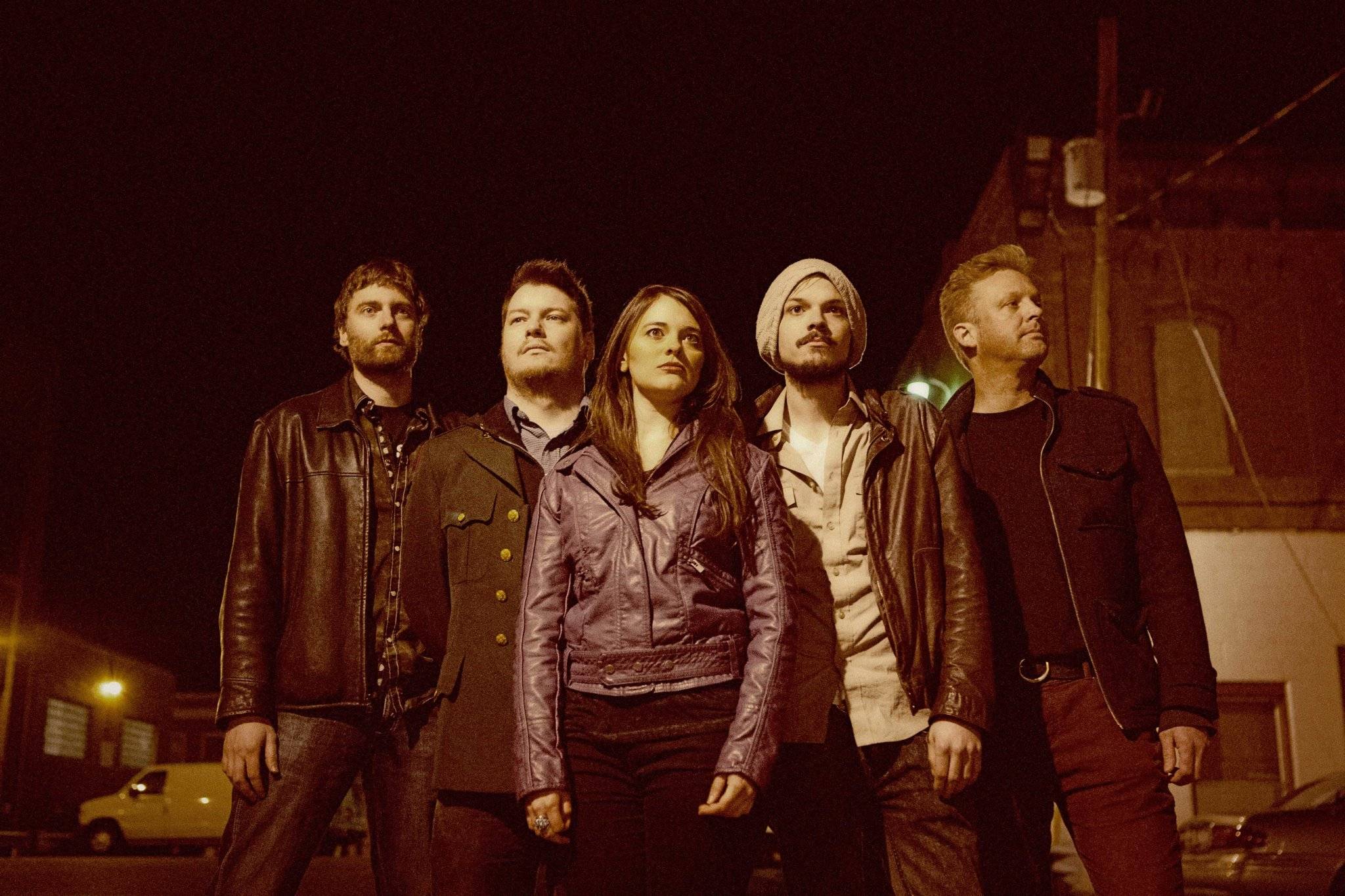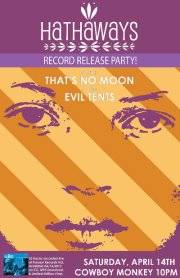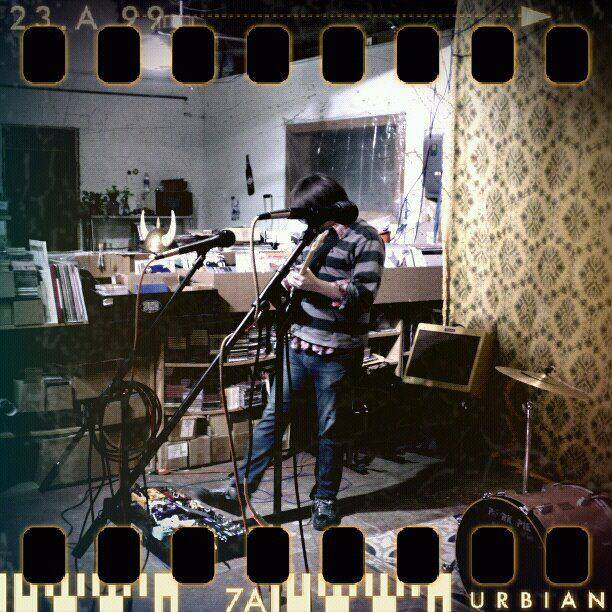
It wasn’t long ago that Hathaways was a quiet little duo featuring just the interplay between siblings Kate and James Hathaway. That band has come a long way and this Saturday the new Hathaways, a five-piece band, will debut their new album at Cowboy Monkey with guests Evil Tents and That’s No Moon.
We spoke recently with Kate Hathaway about the band’s transformation, their latest release (their second, following the Hand Me Down EP from 2010), and what the future holds for the group. Their new album, The Parasol Sessions Volume One, is available for pre-order at Parasol Records or can be picked up at Cowboy Monkey on Saturday. The show starts at 10 p.m. and admission is just $5.
Smile Politely: Hathaways was originally just you and your brother, correct? When did you decide to fill out the band and what was the main reason you wanted to do so?
Kate Hathway: We started as a duo, yes. After doing that for a couple years, we decided we could flesh out the songs so much more with a full band behind us, and give the audience a more engaging show, so we put one together.
SP: Has playing with a full band changed the way you write music?
Hathaway: Well, we definitely have more sonic options, but I’d consider that more of a fine-tuning, production thing. The actual genesis of songs is usually my brother and I with our acoustic instruments, so I suppose the answer is no, not really.
 SP: What is the song writing process like for you, personally?
SP: What is the song writing process like for you, personally?
Hathaway: Some songs just come to you, almost like they’re writing themselves, and in a matter of minutes, it’s basically there. Other songs, James or I might have a chord progression or melody, and we have to just hammer it out, trying different ideas until it takes shape. Sometimes nothing seems to work in a way you like, and then that little fragment of a song gets put up on the shelf, and maybe we’ll make use of it later. Or maybe not.
Once we’ve got a basic idea or song structure, we can introduce it to the rest of the band at practice, and they may have input or other new ideas we can build off of as well. We can trade parts around — maybe John will assume a melody line, freeing James up to just comp and concentrate on his vocals instead. It’s a pretty dynamic process, and a song is never really finished, but sometimes we know when they are at least done evolving. We can always tweak something later if we want to.
SP: One thing that makes your band unique is your use of the charango. I see that you picked it up in college, is there something from your background that led you to that instrument and is that instrument what led you to festivals in Peru?
Hathaway: My mentor, and now close friend Tom Turino, introduced me to the charango my junior year. I had played guitar for years, so I was really excited to learn a new instrument and style. After studying with Tom for a year and then studying in Peru for three months, James and I started to blend the charango and its rhythmic style with our own songwriting. So the charango really is the reason we’ve been invited to festivals and have played tours throughout Peru. I think the Peruvians dig us because we’re using their instruments and traditions to make something new rather than just forcing U.S. culture on them.
SP: What are some of your influences? Your Facebook says, “American pop” and “Peruvian soul”; I was wondering if there were any specific songs/albums/artists that you found particularly inspiring.
Hathaway: Well, we like lots of popular American music from many eras, and then there’s Julio Benavente Diaz and Jaime Guardia (Peruvian folk artists/charanguistas), who made their mark on us as well. Just two distinct styles, and we think we do a reasonably successful job melding them.
 SP: After listening to your album, I hear a resemblance to ’90s alternative (i.e. Gin Blossoms, Wallflowers), do you think this is a fair assessment? If not, what bands would you think Hathaways is comparable to?
SP: After listening to your album, I hear a resemblance to ’90s alternative (i.e. Gin Blossoms, Wallflowers), do you think this is a fair assessment? If not, what bands would you think Hathaways is comparable to?
Hathaway: A decade is a long time, and certainly by now the terms “alternative” or “indie” have really lost any useful meaning they ever had as descriptors. They really mean different things to different people. And I don’t recall any charango or male/female harmonies employed in either of those bands; but truth be told, I wasn’t paying close attention. We do put an emphasis on songwriting over a certain sound/production, and if that says ’90s, well, so be it. But I would suggest bands like New Pornographers or Rilo Kiley as a better comparison.
SP: Can you give me some more info about how this album came about? Specifically, what drew Parasol to you for their videos and what later became the first in a new series?
Hathaway: Geoff [Merritt, Parasol owner] happened to hear us perform as a duo at Sleepy Creek Vineyard in the fall and we became friends. He suggested we shoot some video of the full band performing live just to have a quality example of a live performance to share, something that might help us get some gigs and get our name out there. So we went in and rolled tape one Saturday in January, not really sure how it would turn out, kind of a “let’s see” type of thing. But when we heard what we got on tape, that our performance and the audio came out so well — (Thanks Adam!) — both Parasol and the band felt really good about releasing it. For us, it’s a testament to what we’re capable of live. And for Parasol, it’s the first in a series of live sessions, which is something unique and cool. We’re just really pleased and honored to be the band kicking it off. We actually shot the raw video with some help from a couple of kind friends and I edited it myself.
 SP: Are you officially signed to Parasol or are they just handling this album?
SP: Are you officially signed to Parasol or are they just handling this album?
Hathaway: Well, there is a contract in place for this recording, of course, but we’re not under any obligation to produce five albums in five years or any of that type of thing. I don’t think either us or Parasol want to get ahead of ourselves, since this one hasn’t even been released yet. We’re just focused on this for now.
SP: Do you prefer the live album, like this release, to a traditional studio album?
Hathaway: “Live album” kind of brings up the mental image of ’70s arena rock live albums, a recording of a concert for a live audience, and that’s not exactly what this record is, really. So I guess that’s why the term “session” is probably more appropriate. But yeah, compared to doing a ton of overdubs, which can be an excruciating, nit-picking process that doesn’t necessarily yield better results, our eyes have been opened to a whole other way of recording. Yes, there is some mic bleed. Yes, you have to learn to live with a clam here or there. But if the band has their ducks in a row, it can be so much more efficient and sound just as good. We got a great live energy/vibe on tape, and that’s almost impossible to capture by overdubbing one part at a time.
SP: What was your favorite part of making this album?
Hathaway: A distinct lack of overdubs.
SP: Is there a studio album in Hathaways’ (near) future?
Hathaway: Probably. We’ve just been so busy prepping this release that we haven’t been able to discuss too much else. But we’re still writing, and there’s a crop of new material we want to record. We just need to decide the specific when and how.
SP: When you go to a studio to do another album do you think you’d like to do another “session” album, or do it with overdubs, or some combination of the two?
Hathaway: I suppose a combination. If we spent a whole week rather than just a few hours getting sounds, isolating microphones, and laying down takes, then we could have the best of both worlds. We’d be able to capture the energy of a full band playing live, but also have the ability to go back and record the perfect vocal take or lead or whatever. Having some recourse takes the pressure off. With these recordings, there wasn’t an overwhelming pressure to really nail it like you would if the clock is ticking at $75 an hour in a studio, because this wasn’t necessarily going to be anything at all. If it came out poorly, we’d just scrap it, no big setback. So that casual, no expectations approach actually probably helped us relax and get good takes.
Be sure to check out Hathways with Evil Tents and That’s No Moon tomorrow night at Cowboy Monkey.








